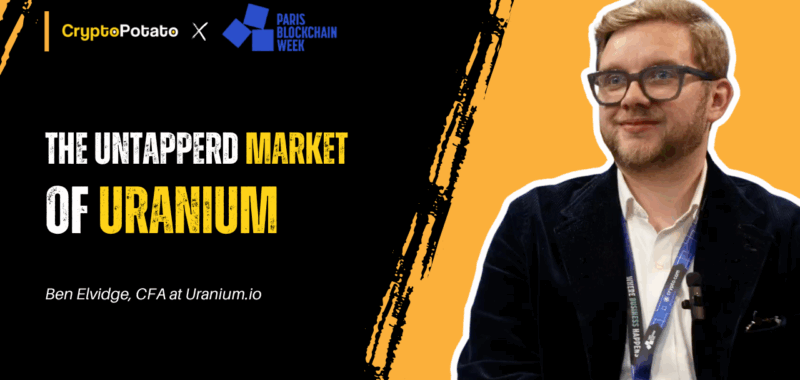At Paris Blockchain Week, Ben Elvidge, Product Lead at Uranium.io, introduced one of the most unexpected tokenization use cases yet: physical uranium.
While tokenizing real estate, art, or equities has become increasingly familiar, uranium—a tightly controlled, highly capital-intensive commodity—has remained far out of reach for the average investor. That’s changing.
Why Uranium?
The uranium market, traditionally opaque and hard to access, trades over the counter in massive lot sizes—typically 100,000 pounds, valued at around $6 million at today’s prices. It’s safe to say that it’s not accessible to retail investors.
“It’s an asset class of critical importance,” said Elvidge, “but historically very difficult to access.”
Through a partnership with the Tezos Foundation, Uranium.io acquired a minimum tradable lot of uranium, stored it in a certified facility, and tokenized it, becoming one of the more interesting RWA crypto projects. Now, the average investor can gain exposure to physical uranium for as little as $4—no need for millions in capital or complex brokerage agreements.
How It Works
Uranium.io leverages a trust-based legal framework under English common law to represent fractional ownership in physical uranium.
The uranium itself is stored in Cameco, one of three global storage facilities approved for this purpose (the other two are in the U.S. and France). Their partner, Curzon Uranium, helped facilitate the process.
Users can buy tokens directly through the platform using a MetaMask wallet and USDC, with built-in on-chain analytics flagging suspicious activity. The onboarding is KYC-light, only requiring full identity verification if a red flag is raised. Each token represents a portion of the physical uranium stockpile, and—unlike most tokenized commodities—token holders can actually request physical delivery, assuming they have an approved converter account and pass relevant nonproliferation checks.
One of the core advantages, Elvidge emphasized, is transparency. Currently, uranium pricing is derived from voluntary broker submissions and updated only during U.S. and UK trading hours.
Uranium.io’s platform introduces real-time price discovery through live token trading. While the platform is still in its early stages, a market-making partner helps ensure price accuracy relative to legacy data feeds.
Beyond Tokenization Hype
Elvidge argues that Uranium.io is a case of real-world tokenization moving beyond buzzwords.
“We’re not doing tokenization for tokenization’s sake,” he said. “This is about taking something previously inaccessible and opening it up.”
Increased access helps retail investors, but also benefits the broader uranium supply chain—particularly fuel buyers and utility providers—by improving liquidity and price transparency. These market efficiencies are sorely lacking in the current OTC-only trading structure.
While spot uranium trading is unregulated in many jurisdictions, Uranium.io has taken a careful approach to legal structure. Its framework doesn’t rely on an SPV and avoids categorizing the tokens as securities. Still, the regulatory environment is complex and remains under constant review, particularly as the project scales.
Why Uranium Now?
The fundamentals support long-term interest. Elvidge pointed to increasing demand from tech giants like Microsoft, Amazon, and Google, all showing interest in nuclear power as a reliable energy source. Governments are shifting toward pro-nuclear energy policies. In 2023 alone, uranium demand reached 194 million pounds, while supply lagged behind at 155 million pounds.
“Uranium has no meaningful correlation with Bitcoin, the S&P 500, gold, or oil,” Elvidge noted.
That makes it an attractive uncorrelated asset at a time when crypto investors are seeking diversification and stability amid risk-off market sentiment.
This interview was produced in partnership with Paris Blockchain Week 2025.

